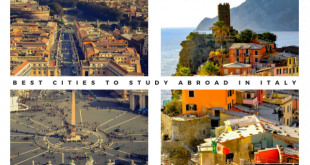Here are our top tips for international students who made the choice to study abroad in Italy. In fact, they are more like a bit of brief advice to prepare you for this big adventure.
It will definitely benefit you. Especially if this is your first experience studying abroad. The first thing you need to do is get your search for the best universities in Italy on.
Then you’d get to know the best cities to study in Italy. Researching how to obtain a study visa in Italy, and asking about the costs of studying and living in Italy, is a crucial part of the process. Ready? Here is the compilation of our tips for international students in Italy.
Table of Contents
Tip 1: Adapt to the lifestyle
If you are not familiar with the language, culture, and customs of the country you will spend your studies, then you’re doomed! Kidding! Although this may cause you some challenges. Moreover, in Italy, shops and restaurants usually open from 10 am to 2 pm, and then close until about 7 pm. (call it the nap time).
This means that restaurants don’t usually serve dinner until 9 pm. With various electrical wall plugs in Italy, you will need an electrical adapter for all of your devices such as a computer one, hairdryer, etc.
Transformers can be expensive, so it is a good idea to take this into account so that you aren’t surprised later.
Tip 2: Learn the language before you travel
Try to learn Italian at home before you travel to Italy. It is best to practice speaking, writing, reading and hearing the language on all platforms. This is one of the most important tips for when you study abroad, and Italy is no exception!
It is also recommended to find some useful Italian phrases that you can use when you first arrive. It will be useful to express yourself in certain situations, for example: when visiting banks, laundries, restaurants and grocery stores.
Going through newspapers, TV shows, movies and radio broadcasts will help you get used to the language and enrich your vocabulary balance.
Tip3: Experience the Italian culture
Studying is granted. We all know that. You are in Italy to study in the first place, however, it is also good to get a gasp f what Italy’s arts and culture have to offer. A community in which you live. Don’t be afraid to challenge yourself and go out, meet new people, and see new places.
Tip 4: Travel! Get to know Italy!
Italy is a tourist country hands down. Take advantage of the opportunity to be there to travel as much as possible.
Traveling around Italy is very easy, with fast trains available and affordable. Depending on where you are, there are many cities worth traveling to.
Tip 5: Get your legal documents in order
Official processes for visas may take 6 to 9 months, so it is very important that this process begins immediately. You will need original copies, as well as signed documents for specific papers. Be sure to meet all requirements before starting to travel.
Be careful that the police in Italy may prevent you at any time from seeing your legal documents. You will not want to get to your university late, or you get rejected because you did not obtain the appropriate legal documents.
Tip 6 : Italian currency
Italy currently uses the euro, which is more expensive than the US dollar. However, the exchange rates change every day. Check to see if your tuition payments are in dollars or euros.
You may need to convert the currency before beginning to prepare logistics services like your apartment, bills, medical needs, and anything else. Create a bank account in Italy. To be able to get an Italian emergency debit or credit card.
Tip 7: Italy mobile phone is on!
Your current mobile phone will most likely not work in Italy, but if that happens, then you will be charged a hefty fee. You can choose to suspend the service on your phone and use Wi-Fi only.
Many chat apps allow you to talk with others for free or at low prices. If you decide to buy a new phone in Italy, you can get sim cards from well-known suppliers such as Orange, and others.
Tip 8: Take a trip to our local market
Buying cheap vegetables and fruits in the local markets with good quality is a wonderful Italian shopping experience to go through.
It will help you practice the language, in addition to saving some money.
Tip 9: Consular information and agents
Read the consular information sheets (and general notices or travel warnings, if any, when traveling).
Only deal with authorized agents when you transfer money to avoid violating local laws.
You can keep the website of the Italian Ministry of Foreign affairs at hand for quick access.
Tip 10: Keep close what’s important to you!
You may want to leave some copies of the itinerary, or passport and visa page with your family or friends at home. It helps when you need to be contacted in an emergency.
We hope our traveling to Italy advice were up to the point. These tips will make your study abroad in Italy memorable and a more fulfilling experience!




 Aljawaz Your guide to study abroad
Aljawaz Your guide to study abroad











